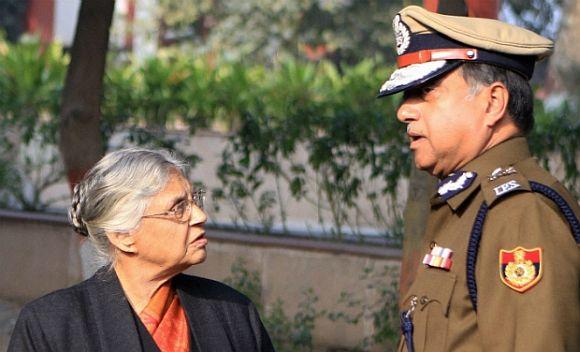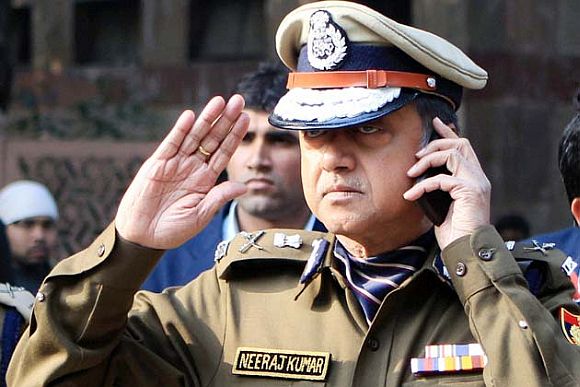
One of the first meetings Neeraj Kumar held after taking over as Delhi Police chief in June this year was with a group of NGOs over rape and other sexual crimes against women in the capital.
Soon after, Kumar proposed that CCTV cameras be installed in over 1,000 public places, including 490 highly-sensitive spots.
Despite the police chief's intentions, a 23-year-old was brutally raped inside a bus recently. And when protesters congregated at the India Gate lawns, Delhi Police used raw force to drive them away.
Delhi Chief Minister Sheila Dikshit, who was for long nursed a grudge against Delhi Police because it reports to the Lieutenant Governor and not to her, wants him out.
But Kumar, 58, who retires in July, has made it clear he won't step down.
"I am not a quitter," he has said.
This is not the first time that Kumar, an Indian Police Service officer of the 1976 batch and a postgraduate from Delhi's St Stephen's College, finds himself in the middle of a controversy.
Click on NEXT to read further...

In February 2002, Kumar took over as joint commissioner of the Special Cell and was constantly in the news for the several "encounters" that took place.
One such encounter, at Ansal Plaza on October 8, 2002, became a huge controversy following allegations that it was stage-managed.
Some in the police circles suspect that this was one of the reasons why Kumar wasn't made Delhi Police commissioner in 2010 (BK Gupta was appointed in his place).
Kumar was instead put in charge of Delhi prisons.
A journalist who visited him at Tihar soon after the police crackdown on Ramdev and his supporters at the Ramlila grounds last year recalls how Kumar explained with diagrams how he would have done things differently and not tear-gassed the gathering.
A year-and-a-half later, Kumar is under fire for tear-gassing and using excessive force on the anti-rape protesters.
Those who have worked with him say he's an upright, though arrogant, officer.
And, he's media savvy. Since he took over the force, his prime focus has been on improving the image of Delhi Police. Hence, the deluge of newspaper advertisements lauding its work.
Click on NEXT to read further...

In 1993, Kumar was posted to the Central Bureau of Investigation. He led the investigations into the Mumbai serial blasts.
He was also at the helm during the Parliament attack investigations. Those who have seen him function in CBI recall how officers from other departments, including the Crime Branch and Special Cell, would come to seek his advice.
So when his name did not feature in the final panel of contenders for the post of CBI director, Kumar promptly went to the Central Administrative Tribunal.
After much wait, Kumar, who digs Pink Floyd, was finally appointed Delhi Police commissioner.
A piquant situation arose when his wife, daughter and son-in-law also arrived at the police headquarters for the formal taking-over ceremony.
Families are usually not expected at this strictly official function. It threw the officials into a tizzy as they made quick arrangement to accommodate the family.
"That's how big it was for him to become commissioner," recalls a source. That's perhaps why Kumar isn't giving up his post easily.